Typing Hetalia characters according to the Myer-Briggs system. Also exploring Zodiac signs as well, on occasion.
Don't wanna be here? Send us removal request.
Photo
I saw this and I was like “oh cool”
but then I saw they’d listed England as an INTJ
and I screamed “NOOOOOOOOOOOOOOOOOOO-”
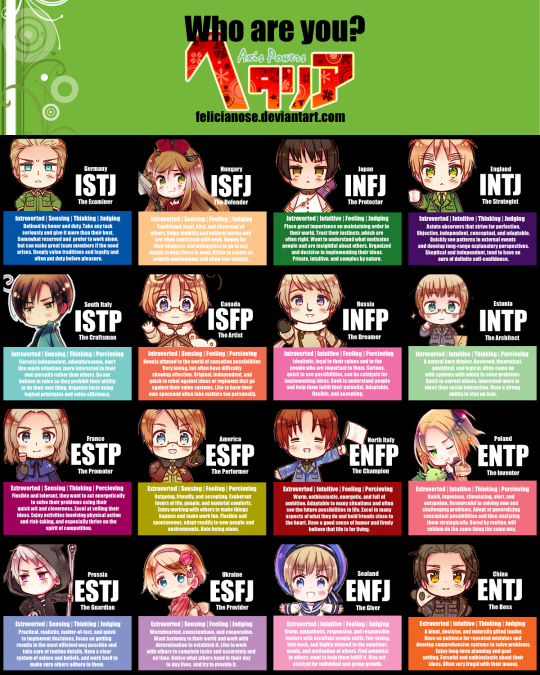
i know i’m five days late to the 10 year anniversary fiasco, but here’s a little something i made, based on cognitive functions!
who are you? i’m japan!
2K notes
·
View notes
Text
Prussia's Type?

Hi, this is APH-MBTI. I’m submitting a post here for any feedback/critique you’d like to give. I am also very sorry for the mistakes from many of my past posts and will try to undo it.
Of course, the typing method used here will be the one mentioned previously.
Anyway, Prussia: this character, no matter how awesome, is more difficult to type. He stands out in this way as many characters tend to have actions, motives, or descriptions that align rather closely with one specific type over another.
For example, compare Himaruya’s early description of England with Jung’s description of the introverted thinking type:
England: “Seems to be cold at first, but is surprisingly devoted to someone if he becomes friends with that person.”
Introverted Thinking Type: “His judgment appears cold, obstinate, arbitrary, and inconsiderate, simply because he is related less to the object than the subject… But the [p. 488] better one knows him, the more favourable one’s judgment becomes, and his nearest friends are well aware how to value his intimacy.”
↑ Though that alone probably isn’t an argument for England’s type, it shows that most character portrayals usually align with some type.
He’s an extravert.
I’d play devil’s advocate, but I can’t.
His energy is much more directed towards the outside world, and extraversion in this case also applies to the physical world, ideas, laws, standards, etc.
So he’s an Exxx, at least.
I believe he has more Te-Fi, not Fe-Ti.
So we aren’t arguing semantics, higher =/= some sort of quantity, but = ranking. Dominant or auxiliary.
He’s described as anything from “a young man who’ll use any means to become strong” despite being “kind of a hooligan” [x] to being “overbearing” and his true nature being “the methodical, severe, serious older brother” [x].
“A young man who’ll use any means to become strong”
This may very well describe the downside of a Te-type, due to inferior feeling. Feelings become repressed, in some cases greatly distorted. The Te-type may be consumed by a rigid “formula” or ideal/aim so much that they do not shy away from less than unethical means. It leaves a strong taste of consequentialism, or “ the end justifieth the means.”
However, Prussia could match the Ne-type, who’s “not infrequently put down as an immoral and ruthless adventurer” (in a “pure Ne-type,” morality is loyal to an intuitive view of things; this is usually less extreme for actual Ne-types). As Ne is largely concerned with scenting out external possibilities, the Ne-type often apply to callings wherein their abilities may expand in many directions; merchants, contractors, speculators, agents, politicians, etc. often belong to this type.
Later on, he’s described as a “methodical, severe, serious older brother” at heart.
This description is more similar to Germany’s, who is more than likely a noticeable Tx-type. Methodical, related to methods or means, is akin to “systematic.” Thinking itself is a rational, systematic process, and he seems more motivated by outside factors, thus extraverted.
And to top it all off, Himaruya said that he “regularly follows a rationalist type of thinking.” Wow, Himaruya.
So Prussia’s an ExTx.
Does he have more predominant intuition or sensation?
A while back, I thought Prussia was an ESTP instead of an ENTP, but I was perhaps overlooking what intuition and sensation actually are, or at least in the extraverted attitude. The only real “direction” I have for him is of an ExTx.
While I initially typed him as a Se-type or Se-aux type, I’m retracting this for the following reasons, many of these being more related to the dichotomies as a last resort:
Prussia loves new things.
Yes, I’m going to start with something stereotypical, but it’s not always a stereotype. Dom. Ne-types are ever looking for new possibilities, and stable conditions seem to stifle and suffocate this type. Se-types also characteristically “seek out what is fresh” (everyone does this to an extent, in fact) but this tends to be most peculiar in Ne-types > Se-types.
The Ne-type “seizes hold of new objects and new ways with eager intensity, sometimes with extraordinary enthusiasm, only to abandon them cold-bloodedly… as soon as a promise of any considerable future development no longer clings to them” (given that real people are not pure Ne-types, I would assume this is a little less extreme).
He’s not as practically inclined as his brother.
Again, another stereotypical sort of thing that I’ll expand on.
Germany described him as knowing “little about common sense.”
He also prioritizes coolness over practicality. In contrast, the Se-type is described as having a bit more realism to things.
He’s also more willing to taking risks in new uncertain ventures with a lot of confidence during the industrial revolution, which was an important event. Germany compares him to acting like a child trading in the stock market. Germany, in contrast, is more hesitant, concerned with if they fail to implicate it.
Prussia’s also then the more ‘willing’ of the two to explore the possibilities of the machinery, whereas Germany initially finds it not rationally plausible but then opens up. Germany may have intuition, but it’s not the first thing he goes to, in comparison to Prussia.
Some differences between him and Germany could be explained by the differences between their perceiving functions.
He makes a reference to being treated like a car’s radio speaker, which Germany doesn’t get why the reference is made, even if he understands it (it’s a simile to that you mostly tune out the car’s radio speaker, or diminish the importance, in contrast to let’s say an orchestra’s concert).
↑ This shouldn’t really be used as an argument as I’m not sure if this is even habitual or type related, but it’s possible that this, along with the above point, means there is a difference between the their predominant perceiving/empirical functions (Se tends to be more concrete and expects such, whereas Ne
Prussia’s perhaps an ENTx.
Does Prussia have a perceiving function first or a judging function?
The perceiving functions and judging functions are different, even though they are not specifically another dimension like introversion and extraversion are an attitude.
There seems to be a conflict of characteristics with Prussia. On one hand, his true nature is considered to be a “methodical, severe, serious” person. On the other hand, he’s also regarded as sometimes “too free.”
Which is his true more “dominant” tendency? Is he actually more of a judging type to the point he sees this as his conscious tendency, or is his judging side the more “occasionally seen” side?
This is the part that has stifled me a bit, and I would enjoy hearing what you think.
I think all of this sounds correct. I’m redoing the masterlist ATM, but I think when I get around to it I’ll change Prussia to an ENTP temporarily.
I don’t think there’s any way he’s an ENTJ. As you pointed out yourself, he does seem to utilize extroverted intuition and not sensing. Furthermore, I don’t think his introverted feeling is that poor. We have Germany down as an ESTJ at the moment - he most certainly is more emotionally intelligent than him. I don’t believe that his “feeling” is so far down the stack.
I have an idea as to whether he’s got a dominant perceiving/judging function, but I want to see what followers say first, if they say anything. If not, then I’ll reblog this later and add on to this.
I’m sorry if none of my additions make sense, I’m still getting back into the swing of things. Thank you so, so much for your submission! It’s greatly appreciated!
57 notes
·
View notes
Text
Them: Whats that thing you like again? Myers briggs something?
Me:

#mbti#memes#no real reason for posting this i'll have a submission up in a few moments#just dealing with my crippling anxiety
8K notes
·
View notes
Photo
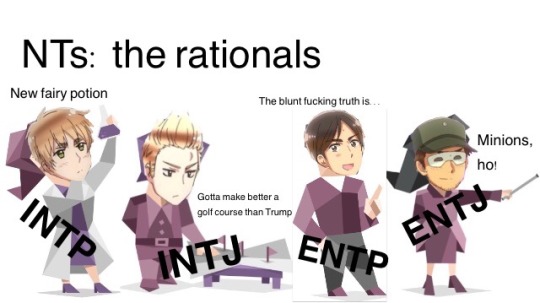
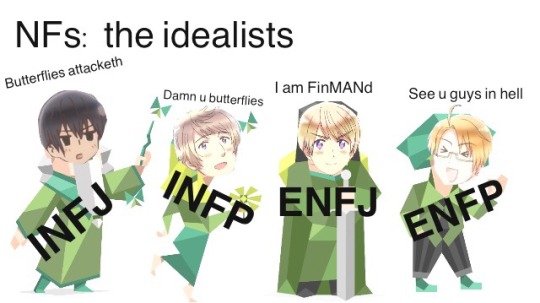

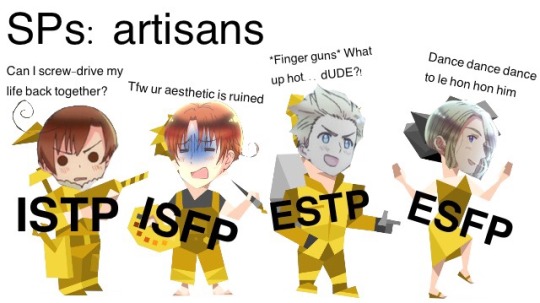
Your basic guide to MBTI for Hetalians, or Hetalia for MBTI fans.
#hetalia#mbti#seeing some of this might encourage me to get back into it#but i think i need to reaquaint myself with a lot of the theories
404 notes
·
View notes
Text
[Archive Repost] Jung v. Common MBTI Theory
Somewhat recently, I read @akhromant’s post.
If you did not read it, the user claims that most of what we know about MBTI is a complete corruption of Carl Jung’s work, even if you use the supposed “function stack,” as even that is likely wrong.
But I also read many reactions—mostly from those who are zealously interested in MBTI/personality types—of people who strongly refuse to at least consider that there are some things incorrect about what many on Tumblr current accept as the go-to theory.
Despite any detriment that I might get for saying this, and to play devil’s advocate, I can as well see many differences between popular theory (what I will refer to here as “MBTI") and Psychological Types that may be either nonconstructive or detrimental to general type theory. Even if such differences aren’t actually so, it might spark interest to some who strongly desire the original theory.
To keep it fair and not be accused of pulling things out of “thin air” (euphemism), I will be using…
Chapter X of Psychological Types
An abstract of the aforementioned chapter for abridgment
Information given on the MBTI foundation’s website
For much of this post, I will be literally copying and pasting the relevant text, simply reformatting it so that while reading, it may flow more nicely.
While it may be helpful for someone who is not as familiar with MBTI, I do apologise for the excessive length taken for comparing the function descriptions, and you can simply read through Jung’s descriptions and the differences between MBTI and Jung on that subject.
Keep reading
8 notes
·
View notes
Text
What is Your Actual Type?
Hello ('ᴗ'*)Welcome to type theory, also known as “those weird abbreviations on my dashboard.”
This post is for anyone, whether you just took a personality type test, or even if you are well aware of MBTI and the functions already.
You may have come across things that mention the “functions” such as “Ne,” “Fi,” etc. If you’ve read into those, you’ve probably concluded that Jung himself, who discovered the fundamental work of this typology, implied that an extravert’s “function stack” is E-I-E-I while an introvert’s is I-E-I-E. For example, an ISFP uses Fi, Se, Ni, and Te, right?
Actually, Jung didn’t imply that at all.
Following Jung’s work consistently and using MBTI’s system to identify the types, an “ISFP” (introverted sensing feeling perceiving) for example would have the “attitude-functions” Si-Fi-Te-Ne.
“What? How can that be?” you may ask, baffled and demanding an answer.
Let’s have a look at Jung’s work then. ♪( ´▽`)
To do this, I will use and quote information directly from chapter X of Psychological Types.
Attitudes (E/I)
The general-attitude types (I/E) are well known. They are “differentiated by their particular attitude to the object.” One’s energy flows either outwardly to people, things, etc. (extraversion) or inwardly to subjective psychological experience (introversion).
Jung continuously emphasizes that one’s attitude of consciousness is either extraverted or introverted. He also follows up with how the unconscious “has as good a claim to an ‘attitude’ as the conscious” and regards “the relation of the unconscious to the conscious as compensatory,” meaning they’re opposites.
For example, the extravert’s “entire consciousness looks outwards to the world.” But “the attitude of the unconscious as an effective complement to the conscious extraverted attitude has a definitely introverting character.“
In other words…
The extravert, predominantly oriented by the outer objective world:
Conscious: Extraverted
Unconscious: Introverted
The introvert, predominantly oriented by the inner subjective world:
Conscious: Introverted
Unconscious: Extraverted
Functions (T/F/S/N)
Thinking, feeling, sensation, and intuition are the four functions described by Jung that someone has. They can be expressed in 8 different ways (e.g., an extraverted thinking [Te] type) as function-types. If you want a general description of each function-type, you can read this abstract if you wish.
Regarding the “stacking” of one’s functions, the dominant function is the most conscious, while the inferior function is the most unconscious. This is mentioned so much in the chapter (in this translation, ”conscious” and “unconscious” appear 337 times) that I will simply leave the following excerpts, as they speak for themselves:
“So long as conscious feeling preserves the personal character, or, in other words, so long as the personality does not become swallowed up by successive states of feeling, this unconscious thinking remains compensatory.”
“For we find in [the introverted intuitive’s] unconscious a compensatory extraverted sensation function of an archaic character. The unconscious personality may, therefore, best be described as an extraverted sensation-type of a rather low and primitive order.”
“A grouping of the unconscious functions also takes place in accordance with the relationship of the conscious functions. Thus, for instance, an unconscious intuitive feeling attitude may correspond with a conscious practical intellect, whereby the function of feeling suffers a relatively stronger inhibition than intuition.“
As someone has a dominant function and inferior one, they also have a secondary function which “can have only a secondary importance” that “comes into play more as an auxiliary or complementary function.”
Auxiliary and Tertiary
These are the two views of the order of functions we can now consider: this one, the one that I first learned of from reading @akhromant‘s posts and reading chapter X to see for myself:
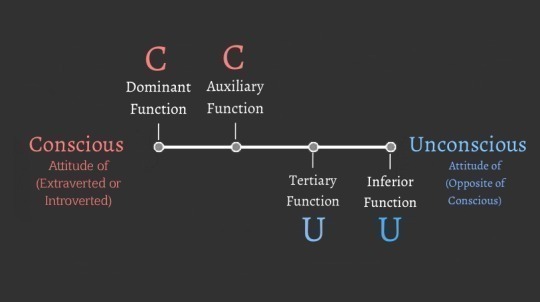
Or this one, the one that many who discuss the types and their “functions” follow:

Note: the auxiliary and tertiary functions are relatively less conscious or unconscious to the dominant and inferior functions.
It becomes clear that the order/”stacking” of the functions, according to Jung, is E, E, I, I for extraverts or I, I, E, E for introverts when you account for the following text (italicized emphasis added):
“[I]n conjunction with the most differentiated function, another function of secondary importance, and therefore of inferior differentiation in consciousness, is constantly present, and is a – relatively determining factor.”
“I have frequently observed the way in which a physician, in the case for instance of an exclusively intellectual subject, will do his utmost to develop the feeling function directly out of the unconscious. This attempt must always come to grief, since it involves too great a violation of the conscious standpoint… But the approach to the unconscious and to the most repressed function is disclosed, as it were, of itself, and with more adequate protection of the conscious standpoint, when the way of development is via the secondary function-thus in the case of a rational type by way of the irrational function. For this lends the conscious standpoint such a range and prospect over what is possible and imminent that consciousness gains an adequate protection against the destructive effect of the unconscious. Conversely, an irrational type demands a stronger development of the rational auxiliary function [p. 517] represented in consciousness, in order to be sufficiently prepared to receive the impact of the unconscious.”
It also becomes the only possible “order” of attitude-functions when you consider everything in total that Jung had discovered:
You have an attitude of the conscious and an attitude of the unconscious, one extraverted (E) and the other introverted (I)
Your conscious attitude is predominant in skill/ability compared to your unconscious
You have four functions: thinking (T), feeling (F), sensation (S), and intuition (N), and the “order” of each is dominant > auxiliary > tertiary > inferior
Two functions share the conscious attitude while two functions share the unconscious attitude
Your dominant function has your conscious attitude while your inferior function is unconscious
Therefore, because…
The conscious attitude is inherently predominant to the unconscious attitude,
The auxiliary function is predominant to the tertiary function,
You have two functions with the conscious attitude and two with the unconscious attitude,
Your auxiliary function shares the attitude of consciousness, while your tertiary function shares the attitude unconsciousness
Therefore, an extrovert’s “function stack” is E, E, I, I while an introvert’s function stack is I, I, E, E. For example, an “ENFP” actually has Ne, Fe, Ti, and Se
Regarding MBTI
The Myers-Briggs Type Indicator is technically just a system with the goal of practically indicating your type.
However, MBTI works with only the dichotomies: extraversion, introversion, sensation, intuition, thinking, feeling, judging, and perceiving. It pays no mind to the “functions,” or what they call “type dynamics.” And I don’t blame them considering how misunderstood the “functions” are.
When we use MBTI to speak of a type and the “functions,” we are using it to indicate which of the 16 psychological types is being referred to. For instance, “extraverted sensing thinker” to different people could either mean an extraverted thinking type with auxiliary sensation (Te1-Se2) or an extraverted sensation type with auxiliary thinking (Se1-Te2).
MBTI can both (1) help clarify whether one is a “judging” type whose rational/judging function is predominant (e.g., ESTJ) or a “perceiving” type whose irrational/perceiving function is predominant (e.g., ESTP), and (2) it can help in identifying general characteristics of the psychological types.
Σ(-᷅_-᷄๑) MBTI and attitude-functions commonly become inconsistent together when speaking of the introverts, in claiming that an IxxP has a dominant judging function (e.g., an INFP has dominant Fi) while an IxxJ has a dominant perceiving function (e.g., an INFJ has dominant Ni). Some may argue that it only indicates the first extraverted function, but as we just saw, even if that was a justification instead of just an observation, it would be on faulty premises.
A possible solution is to show that in actuality, an IxxP’s functions are Pi, Ji, Pe, Je while an IxxJ’s functions are Ji, Pi, Je, Pe:
IxTJ: Dominant Ti (Ti1)
IxFJ: Dominant Fi (Fi1)
ISxP: Dominant Si (Si1)
INxP: Dominant Ni (Ni1)
In Conclusion
When you learn about and follow the work of Jung and MBTI, a person’s “function stack” is conscious-unconscious, or E-E-I-I for extraverts and I-I-E-E for introverts.
The most known function stack, where your attitude of consciousness shifts in and out (or out and in) is inconsistent and incompatible with Jungian type theory and MBTI because the infamous “stack theory” ignores and contradicts the foundation of introversion and extraversion: the conscious and the unconscious
An IxxP has a dominant perceiving function while an IxxJ has a dominant judging function, or else MBTI becomes inconsistent, saying “judging” when meaning “perceiving” and vice versa.
(ノ_<。)ヾ(´ ▽ ` ) I apologize for the length of this post.
39 notes
·
View notes
Text
Welcome to the MBTI community! A crash course in MBTI (with a brief note on socionics)
Look. I get it. It takes a lot of time to really get into MBTI and Enneagram and sometimes you just want to ask a person things and get an answer and be done. Then they respond and are like “um that’s not a real thing.” So here’s a way to understand what is a real thing. This is not in depth at all. You have to put the work in to really get things. I can’t beam them into your head.. But it’s a start.
Also this post is long but I tried to make things as simple as possible. The tone is going to be a little “See Spot Run” as a result which as xkcd says, is not actually a bad thing.
An Enneagram post will follow shortly.
MBTI - Cognitive Functions: 16 types, made up of combinations of four functions. People will talk about shadow functions. It’s fun to think about when you know what you’re doing. You do not know what you’re doing (yet) so just ignore them.
The function categories are: sensing (perceiving concrete things), intuition (perceiving abstract things), thinking (making judgments based on logic) and feeling (making judgments based on morality). They can be extroverted (focused on the outside world) or introverted (focused on the inner world). The functions all have 2 letters in them. The first stands for the category (first letter of the category except for intuition which is N instead), the second is i for introverted or e for extroverted. Also lots of people spell extroverted as extraverted. That is in fact probably the correct way to do it but it looks weird to me and so I’m just going to do my thing.
Sometimes people spell intuition like this: iNtuition. This makes the fact that ‘N’ is used more apparent, or you can just know how to spell the word intuition and that we use the letter N and not make it look like the world’s worst Apple product.
You have one of each category of function! Two perceiving and two judging. One of your perceiving functions is extroverted and one is introverted, and the same goes for judging. So Se and Ni always go together, as do Si and Ne (the perceiving functions). The judging function pairs are Te and Fi, and Fe and Ti.
Really oversimplified descriptions:
Se: Objectively perceives the outside concrete world and their experiences in it. This usually translates to being very aware and adaptable to their surroundings, regardless of how things are behaving.
Si: subjectively perceives the outside concrete world and their experiences in it. This usually translates to them trusting past experiences they have had and expecting things to behave as they previously have.
Ne: objectively perceives concepts. This usually translates to getting lots of inspiration and ideas from everywhere and making unrelated connections about how things may behave.
Ni: subjectively perceives concepts. This usually translates to having a very specific and personal vision of how they believe things will behave.
Fe: Uses outside systems of morality to make judgments. This usually translates to prioritizing overall benefit to groups of people rather than specific individuals.
Fi: Uses inner systems of morality to make judgments. This usually translates to prioritizing individuality and authenticity over group harmony.
Te: Uses outside systems of logic to make judgments. This usually translates to prioritizing efficiency and hard evidence to get something done over having every possible piece of evidence or the most elegant solution.
Ti: uses inner systems of logic to make judgments. This usually translates to prioritizing internal logical consistency and having all the possible information and the most elegant solution over getting something done quickly and in a way easily communicated to others.
MBTI - your function stack:
Your first function is your strongest function. This is the dominant function. It’s your default way of doing things. It can be any one of those 8 functions I introduced. People will say “I’m a <function name>-dom” to indicate that.
Your fourth function is your inferior function. It’s what you’re worst at. This is the function that’s normally paired with your dominant function (so if you’re an Se dom, your inferior function is Ni).
Your second function is also pretty strong. It’s your auxiliary function. If your dominant function is extroverted, your auxiliary one will be introverted (and vice versa), and if your dominant function is a judging function your auxiliary one will be a perceiving function (and vice versa).
Your third function is called your tertiary function and it will be the function that’s paired with your aux function.
MBTI - your type:
Look at your dominant function. If it’s extroverted, you are an extrovert (this doesn’t mean the traditional ‘energized by people’ thing it does outside of MBTI. MBTI doesn’t have a concept of ambiversion. Also everyone is to some extent ambiverted in that introverts don’t burst into flames when they have to talk to people and extroverts don’t die when they haven’t been around a person for 5 seconds, so chill). If it’s introverted, you’re an introvert (ditto). The first letter of your type is E or I, respectively.
Look at the first letter in your dominant function. If it’s a perceiving function (S or N) then that’s the second letter in your type, and the first letter of your aux function is the third letter in your type. If it’s a judging function (F or T) then that’s the third letter in your type, and the first letter of your aux function is the second letter in your type.
Now: if one of your top two functions (dom and aux) is Fe or Te (an extroverted judging function), you are a judger and the last letter in your type is J. If one of your top two functions is Ne or Se (an extroverted perceiving function), then you are a perceiver and the last letter in your type is P.
An example
Let’s say you think your dominant function is Se. Then your inferior function has to be Ni. You then look at the descriptions for the introverted judging functions (Ti and Fi) and think that your auxiliary function is Fi, which means your tertiary must be Te. Your functions in order are Se-Fi-Te-Ni.
To figure your type’s name out: your first function is extroverted, so you’re an EXXX.
Your first function is a perceiving function and the letter is S - ESXX
Your second function’s letter is F - ESFX
You have Se in your top two functions, so your type is ESFP.
MBTI - groupings
A guy named Keirsey split up the types into groups that he thought behaved similarly and named them:
XXSP - The Artisans
XXSJ - The Guardians or The Sentinels
XNTX - The Rationals
XNFX - The Idealists
A lot of people aren’t big fans of this split both because the names aren’t particularly useful and because the system is inconsistent in terms of functions, but you will see these terms sometimes.
MBTI - loops and grips
A loop is when you use your dominant and tertiary function without checking in on your secondary function.
This is not necessarily bad if you’re using it for a brief period of time. For example, let’s say you’re an INTJ and your friend is crying and doesn’t really want to talk about it. Your Te is most likely going to try to focus on solutions - how to make this stop, how to make them feel better. But this is an emotional/people-oriented situation, so using your Ni to predict what’s wrong and your Fi to act in a way that is in line with your values re: friendship might be more successful.
On the other hand it can be bad if you do this for an extended period of time. As you notice, the two functions are both in the same direction (introverted or extroverted) so introverts aren’t relying on any external direction or systems, and extroverts aren’t relying on any internal direction or systems. As a result, introverts can become irrational and out of touch with reality without some external input, and extroverts can become dominating and reckless.
Grips are when you unhealthily skip all your functions and go straight to your inferior function. These are almost always bad, and are not the same as using your inferior function in a healthy way.
The basic grip behaviors by inferior function are:
Se grip (Ni doms): engaging in purely physical and sometimes reckless behaviors to the point of loss of control. Can be anything - exercise, eating, drinking, drugs, sex, risky behaviors of all kinds.
Si grip (Ne doms): obsessiveness, hypochondria, hypercritical, haunted by the past, fixating on a single possibility instead of exploring many.
Ne grip (Si doms): (this is my inferior function so I’m a little more familiar with it). Either anxiety about the future, seeing catastrophe no matter what you do, or alternately wanting to throw away all your routines and habits and run away instead of getting rid of only what doesn’t work.
Ni grip (Se doms): Paranoia, obsession over the future, seeing or looking for signs/omens rather than the real world, withdrawing.
Fe grip (Ti doms): Emotional volatility, needing external validation from others or alternately feeling rejected and alienated from others.
Fi grip (Te doms): Hypersensitivity, self-pity, withdrawal, ‘me against the world’ mentality.
Te grip (Fi doms): harshness, micromanaging, abandoning values and doing anything to achieve your ends or alternately feeling incompetent.
Ti grip (Fe doms): overanalyzing, withdrawing from personal relationships in particular, or alternately becoming highly critical of people to whom you are close.
Basically: introverts tend to act/lash out as their inferior functions are extroverted, and extroverts tend to withdraw as their inferior functions are introverted, and the most clear sign is that they aren’t using their dom (or other) function.
MBTI - but I feel like I use all the functions!
You may have noticed that you can only have one extroverted perceiving function, one extroverted judging function, one introverted perceiving function, and one introverted judging function.
If you feel like you use functions that cannot both be in your top four (your stack), pick the one that you seem to use more and follow the rules. Will it necessarily be right? No. That’s why you have to learn more. Ultimately you still have to put in some effort ,but at least this way you’ll have a type that makes sense and exists, and if you find it doesn’t fit well, you can look into similar types that might fit better.
Why do you feel like you use multiple functions that can’t be in your stack? Usually it’s either because you don’t understand the functions yet (this isn’t your fault. They’re not easy to understand and they’re hard to describe well), and because you don’t pick up one function, use it, and then put it away. You’re constantly using them together, and that’s good because most situations require that you intake (perceive) information and then do something with it (judge). So trying to consider them in isolation can be hard.
Also: you don’t use your first function first in every single situation, because that wouldn’t work out well for you. So if you’re sometimes very outgoing and sometimes very withdrawn, and sometimes you make choices based on morality and sometimes on logic (etc, etc) you still have one MBTI type. People change how they behave depending on the situation. You still only have one MBTI type.
Finally, your functions are how you process information, but consider the big picture and your motivation. If you brainstormed once and it went well, or if you helped a group of friends get along once, that doesn’t necessarily mean you’re an Ne or Fe user respectively. Think about how you generally and repeatedly behave. We all do some things that could be ‘typed’ one way or another, so consider why you do things and what your repeated behaviors and motivations are, not one-offs.
You don’t have more than one type. If you think you have more than one type, you don’t.
A brief note on socionics:
Socionics is an interpretation and expansion on the Jungian theory that also produced MBTI. It’s highly detailed but a bit more focused on behavior than cognition. The functions are have the same names and are similar but not exactly the same. I’m less knowledgeable about it than MBTI but since it looks a lot like MBTI, here’s what will help you notice if something’s a socionics post so that you can do your own research.
Socionics types are written a little differently. They only look at the dominant function. If it’s a perceiving one, you’re a perceiver (and they write that as a lowercase). If it’s a judging one, you’re a judger (also in lower case).
What this means practically is that if a type is an MBTI extrovert, the same functional stack (REMEMBER THAT MBTI FUNCTIONS AND SOCIONICS FUNCTIONS DON’T MATCH UP PERFECTLY) will result in a type that’s the same, except the last letter is lower case (ESFP -> ESFp).
If a type is an MBTI introvert, the last letter switches and becomes lowercase (INFJ->INFp).
Socionics goes into more depth about the four functions below your main stack, so if you’re interested in shadow functions, check it out. In socionics, your 5th and 6th functions (flip your dom and aux functions introversion/extroversion axis to get these) are actually pretty good, and you are terrible at the introverted/extroverted version of your tertiary function. This is sometimes called PoLR.
Socionics also groups the types into something called Quadras.
2K notes
·
View notes
Photo

America’s Fi can’t wait for this magical adventure.
England’s Ti just loves to spoil everything, though.
(I do love seeing interactions between these two. I think in terms of MBTI, they have the most obvious an the strongest characterizations, and you can just see their cognitive functions bouncing off each other in each comic. It’s wonderful.)
34 notes
·
View notes
Photo

America’s Te is hating this holiday around about now.
Fortunately, his Fi romanticism will pull him through!
(Yes this blog is still active, and it will always be active, because I will be Hetalia trash forever.)
32 notes
·
View notes
Photo
Good reply right here. 10/10 analysis.
Yes, you’re right. I didn’t consider how his behaviour fit into other parts of his personality in the long run - I was more focused on this strip in particular.
I agree that an aux-Ti would have probably already done this internally beforehand - I think this is more of a case of classic Te organising. And yes, this doesn’t seem to be very... Fe-ish, does it? (Also, good job spotting the possible inferior Si hint! I didn’t notice that at all!)
So an ENFP he remains for now. Like every good protagonist :P
Thank you for your comment! It was very helpful!

It seems like America’s trying to get his Ne under control! My brother and I both do things like this (albeit mentally), so we relate as high Ne users.
However, I do have a wee bit of a problem here. I have America typed as an ENFP - and I hold to that opinion - but I am not sure if what he is doing here is an example of Ti-like behaviour (attempting to make data concise, categorizing, figuring out how things fit into the bigger picture) or Te-like behaviour (organising, using visual means to organise their world, choosing important information, efficiency, dedication to a project). It’s stumbling me.
In all honesty, the fact that he seems to straight up keep a chart of who he’s going to prank call at any given time is fairly Te-like, and fits into the Tertiary Te model that I have for him (organising things but finding it hard to focus on one thing, having a dedicated plan but being pretty bad at following through on it, etc). I also think it explains a lot of his behaviour - I should definitely get around to finishing the draft I have explaining him, I think.
But then, there are Ti elements to his thinking - such as how he seems to catagorize individuals, for example. Some of the questions shown above interest me, because it shows clearly that he’s constatly thinking of how this will affect him in the larger state of things.
But then that is also a Ne thing. (Queue the screams of the damned pooring from the bloody gates of Hell.)
The action itself (having many ideas and narrowing them down to a single one, while still having options itself) is very Ne, but then, that’s another huge problem with typing America for 100% certain.
He’s not like England, who pretty much explains his thought processes constantly, and who cycles through his functions like channels on the TV. He (America, not England) is most certainly a Ne-dominant first and foremost, and it seems like pretty much all of his actions are Ne based. Most evidence I find pointing to either Te or Ti leads straight back to his overwhelming Ne. It’s frustrating to say the least. It’s like Iceland all over again, lmao.
And we all know what happened with Iceland.
I think in the end we’ll have to focus on whether he is Fi or Fe to finally settle this debate, because I can’t see any other way. I’ll start doing this now (and have a document drafted for it). If I forget to do it, please remind me, it’ll be appreciated.
My apologies if I explained my thoughts poorly.
Also aaaay I made a post did you guys miss me because I sure missed you
#hetalia#mbti#hetalia mbti#reply#pandemial is the best i'll say it right now#aph america#enfp#;)#i consider this blog a colaborative effort#and i consider my spelling an F-
52 notes
·
View notes
Photo

It seems like America’s trying to get his Ne under control! My brother and I both do things like this (albeit mentally), so we relate as high Ne users.
However, I do have a wee bit of a problem here. I have America typed as an ENFP - and I hold to that opinion - but I am not sure if what he is doing here is an example of Ti-like behaviour (attempting to make data concise, categorizing, figuring out how things fit into the bigger picture) or Te-like behaviour (organising, using visual means to organise their world, choosing important information, efficiency, dedication to a project). It’s stumbling me.
In all honesty, the fact that he seems to straight up keep a chart of who he’s going to prank call at any given time is fairly Te-like, and fits into the Tertiary Te model that I have for him (organising things but finding it hard to focus on one thing, having a dedicated plan but being pretty bad at following through on it, etc). I also think it explains a lot of his behaviour - I should definitely get around to finishing the draft I have explaining him, I think.
But then, there are Ti elements to his thinking - such as how he seems to catagorize individuals, for example. Some of the questions shown above interest me, because it shows clearly that he’s constatly thinking of how this will affect him in the larger state of things.
But then that is also a Ne thing. (Queue the screams of the damned pooring from the bloody gates of Hell.)
The action itself (having many ideas and narrowing them down to a single one, while still having options itself) is very Ne, but then, that’s another huge problem with typing America for 100% certain.
He’s not like England, who pretty much explains his thought processes constantly, and who cycles through his functions like channels on the TV. He (America, not England) is most certainly a Ne-dominant first and foremost, and it seems like pretty much all of his actions are Ne based. Most evidence I find pointing to either Te or Ti leads straight back to his overwhelming Ne. It’s frustrating to say the least. It’s like Iceland all over again, lmao.
And we all know what happened with Iceland.
I think in the end we’ll have to focus on whether he is Fi or Fe to finally settle this debate, because I can’t see any other way. I’ll start doing this now (and have a document drafted for it). If I forget to do it, please remind me, it’ll be appreciated.
My apologies if I explained my thoughts poorly.
Also aaaay I made a post did you guys miss me because I sure missed you
52 notes
·
View notes
Text
Hetalia MBTI Types Masterpost
Feel free to suggest new conclusions or ideas for characters.
**I am basing this on the 8 cognitive functions and the webcomic personalities. I do not know enough about the dubbed episodes.**
Many of these suggestions are from @hetalia-mbti and their conclusions.
[?] = Additional Uncertainty
-
APH North Italy: ISFP or ESFP APH South Italy: ISTP APH Germany: ESTJ or ISTJ APH Prussia: ESTP, ESFP, or ENTP [?] APH Japan: INFJ APH America: ENFP or ENTP APH England: INTP APH France: ESFP or ENFJ APH Russia: INFP APH China: ESTJ APH Canada: INFJ
APH Rome: ESTP [?] APH Germania: ISTJ [?] APH Hungary: ESFJ APH Austria: INTJ APH Spain: ENFP [?] APH Ukraine: ESFJ [?] APH Belarus: INTJ [?] APH Poland: ESFP or ENFP [?] APH Lithuania: ISFJ APH Latvia: ISFP [?] APH Estonia: INTP APH Finland: ENFJ [?] APH Norway: INTJ APH Sweden: ISTJ [?] APH Denmark: ESTP APH Iceland: INFP APH Turkey: ENTJ [?] APH Greece: INFP or INTP APH Hong Kong: ISTP [?] APH Taiwan: ESFP [?] APH India: ENTP APH Liechtenstein: ISFJ [?] APH Switzerland: ISTP APH Sealand: Unknown APH Netherlands: INTJ [?] APH Belgium: ESFJ or ISFJ [?] APH Seychelles: ISFP [?]
96 notes
·
View notes
Note
What type are England, Denmark and Norway?
INTP, ESTP and INTJ respectively until further notice.
37 notes
·
View notes
Text
PSA
((Holy shit. I just saw all the posts about what has happened in Paris.
PLEASE DO NOT BLAME THIS ON MUSLIMS. PEOPLE FROM OTHER RELIGIONS DO BAD THINGS TOO. JUST DON’T BLAME THEM FOR THIS PLEASE. AND PLEASE HETALIA FANDOM. DO NOT ROLEPLAY OR WRITE FANFICTION/DRAW FANART ABOUT THIS. THIS IS NOT SOMETHING TO JOKE ABOUT))
#non-mbti#we must keep our heads#hatred towards muslims is what these sick fuckers want#please don't blame innocent muslims for this
386 notes
·
View notes
Text

(Has this been done yet? I have no clue lol)
66 notes
·
View notes
Note
Have you forgotten about Romania?
No I haven’t!
Sorry for not replying to people’s asks. My life’s been pretty chaotic for the past few years, but I’m looking to change things for myself at the moment. Understandably, I haven’t had much time to be on tumblr, nor much energy either. However, I look forward to being able to get back to normal soon!

You’re welcome.
10 notes
·
View notes